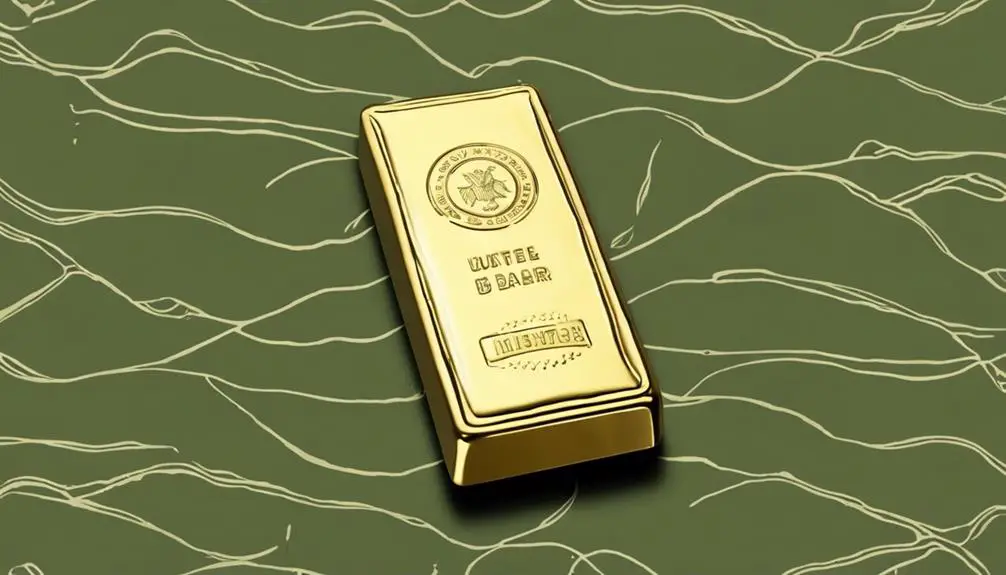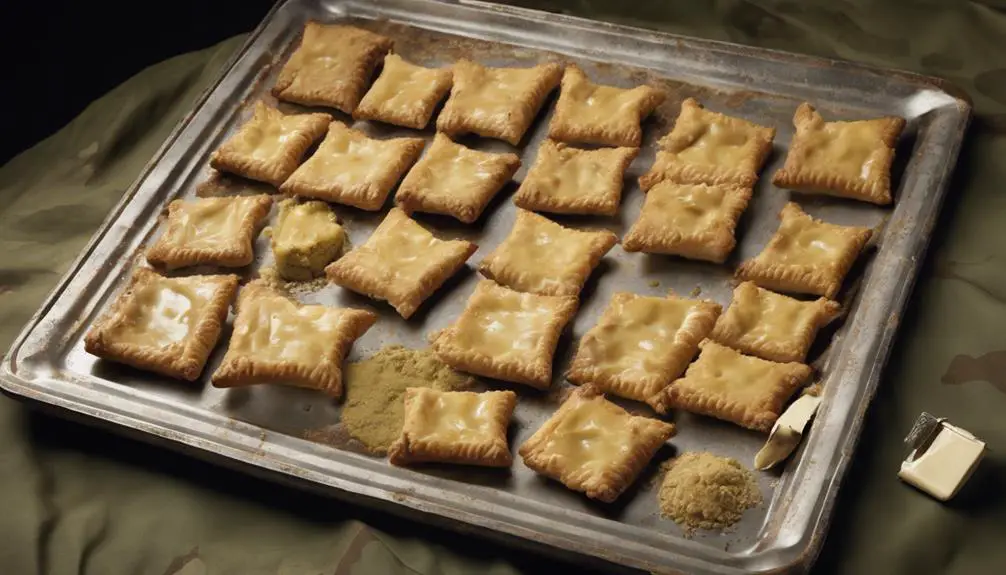When you enter the military as a newly commissioned officer, you're commonly referred to as a 'butter bar,' a nostalgic term that originated in the mid-20th century, derived from the gold bars worn on your uniform, which resemble a pat of butter in both color and shape. This term is more than just a nickname – it symbolizes your fledgling status and inexperience. Your peers and superiors use it to poke fun at your lack of experience, but it's also a term of endearment. As you learn to navigate the military hierarchy, you'll discover the deeper significance of being a butter bar and how it shapes your identity as an officer.
Origins of the Term Butter Bar

The term 'butter bar' originated in the mid-20th century, when newly commissioned officers in the US military were issued gold bars as rank insignia, which resembled the color and shape of butter.
As you explore military history, you'll discover that this term is closely tied to the prestigious West Point, the United States Military Academy. It was here that young cadets, fresh out of the academy, were awarded their first officer rank, marked by the gold bar insignia.
As they began their military careers, their peers and superiors affectionately referred to them as 'butter bars.' This nickname stuck, becoming an integral part of military slang.
You'll find that the term 'butter bar' is still widely used today, symbolizing the early stages of an officer's military career.
Meaning Behind the Slang
Your experience as a newly commissioned officer is marked by the weight of responsibility, and the 'butter bar' moniker serves as a constant reminder of your fledgling status within the military hierarchy. This nickname, though seemingly trivial, holds significant meaning behind its humor.
The term 'butter bar' is derived from the gold bar insignia worn by second lieutenants, which resembles a pat of butter. This butter symbolism isn't coincidental; it represents the perceived softness and inexperience of new officers. Military humor often relies on irony and sarcasm, and the 'butter bar' term is no exception. It's a lighthearted way to poke fun at the challenges and uncertainty that come with being a new officer.
The term also serves as a gentle reminder that you're not expected to have all the answers, and that growth and learning are an integral part of your military journey. By embracing the 'butter bar' moniker, you're acknowledging the steep learning curve ahead, while also recognizing the importance of humility and adaptability in your new role.
Use in Military Culture

You'll often hear the term 'butter bar' tossed around in casual conversations among military personnel, serving as a lighthearted way to acknowledge the challenges of being a new officer. However, beneath the surface, the term reveals a deeper significance in military culture. It highlights the camaraderie dynamics within the military, where experienced personnel often take newcomers under their wing, providing guidance and support. This dynamic is essential in fostering a sense of belonging and facilitating the adaptation into the military ranks.
| Rank Hierarchy | Responsibilities | Challenges |
|---|---|---|
| 2nd Lieutenant | Leadership, Decision-making | Adapting to authority, earning respect |
| New Officer | Team management, Task delegation | Building trust, setting boundaries |
| Seasoned Officer | Mentoring, Guidance | Balancing authority, empathy |
In this context, the term 'butter bar' serves as a reminder of the importance of building relationships within the military, where rank hierarchies play a significant role. As you navigate the complexities of military life, the 'butter bar' nickname becomes a symbol of growth, learning, and camaraderie.
Evolution of the Nickname
As you explore the origins of the term 'butter bar', it becomes clear that its evolution is closely tied to the cultural and historical context of the military. The nickname's development is a reflection of the military's cultural significance, where humor and satire are used to cope with the stresses of war.
In the historical context of World War II, the term 'butter bar' emerged as a way to poke fun at the gold bars worn by second lieutenants. The insignia, resembling a pat of butter, became a symbol of inexperience and naivety. Over time, the term took on a life of its own, with each generation of soldiers adding their own twist to the nickname.
The evolution of 'butter bar' is a demonstration of the military's ability to create a unique cultural identity. Through humor and satire, soldiers have created a shared experience that transcends rank and branch.
As you delve deeper into the world of military slang, it's clear that the 'butter bar' nickname is more than just a humorous jab – it's a reflection of the military's cultural significance and historical context.
Impact on Officer Morale

The nickname 'butter bar' has a profound impact on the morale of second lieutenants, influencing their perception of themselves and their role within the military hierarchy. You might wonder why this seemingly innocent nickname could have such a significant effect.
The answer lies in the way it's perceived by the officers themselves. When you're constantly referred to as a 'butter bar', it can create a sense of insecurity and self-doubt. You start questioning your leadership abilities and wonder if you're truly cut out for the role. This can lead to a leadership crisis, where you struggle to assert your authority and make decisive decisions.
On the other hand, some second lieutenants take the nickname as a challenge, using it as a morale boost to prove themselves. They work harder to earn the respect of their peers and superiors, ultimately becoming more confident and effective leaders.
The impact of the 'butter bar' nickname on officer morale is complex, but one thing is certain – it's a significant factor in shaping their perception of themselves and their role in the military.
Frequently Asked Questions
Can Enlisted Personnel Use the Term "Butter Bar" in Formal Reports?
When crafting formal reports, you should maintain a professional tone and language. As you write, ask yourself: would using colloquialisms, like 'butter bar,' undermine the report's credibility?
The answer is yes. While it might be common in casual conversations, using slang terms in formal documents can come across as unprofessional.
Instead, opt for formal designations, such as 'Second Lieutenant' or 'Junior Officer,' to guarantee your report exudes professionalism and maintains a formal tone.
Is the Term "Butter Bar" Used in All Branches of the Military?
As you explore the world of military jargon, you'll find that the term 'butter bar' isn't universally used across all branches. Like a thread weaving through a complex tapestry, the origins of this term are rooted in military history.
While it's commonly associated with Officer ranks, its usage varies between branches. For instance, the Army and Air Force use it to refer to 2nd Lieutenants, but the Navy and Marines don't use it at all. Understanding these branch differences is key to grasping the nuances of military lingo.
Can a Butter Bar Give Orders to Higher-Ranking Officers?
As you navigate the complexities of military hierarchy, you wonder if a junior officer, like a butter bar, can give orders to higher-ranking officers.
In a traditional chain of command, respect dynamics dictate that junior officers follow orders from seniors, not the other way around.
However, in exceptional circumstances, a butter bar may be entrusted with specialized knowledge or expertise, allowing them to provide guidance to higher-ranking officers, but only within a specific context and with clear boundaries.
Is the Term "Butter Bar" Commonly Used in International Militaries?
Imagine you're a young officer in the French Foreign Legion, freshly commissioned and enthusiastic to prove yourself. When you ask about the term 'butter bar,' you're met with confusion.
That's because this slang term is uniquely American. While other militaries have their own ranks and insignia, the cultural significance of 'butter bar' hasn't seen widespread international adoption. It's an Americanism that hasn't crossed borders, remaining a peculiarly US military phenomenon.
Can a Butter Bar Be Promoted to a Higher Rank Immediately?
When considering a rapid promotion, you'll need to examine the rank requirements and typical promotion timeline. Typically, promotions follow a structured timeline, with officers meeting specific requirements, such as time in service, training, and performance evaluations.
While it's possible for exceptional officers to accelerate their career, immediate promotion to a higher rank is rare. You'll need to meet stringent requirements, demonstrating exceptional leadership, skills, and achievements to justify an expedited promotion.
Conclusion
As you reflect on the term 'butter bar,' you've likely gained a deeper understanding of its significance in military culture.
Like a delicate dance, the nickname has evolved over time, influenced by the dynamics between enlisted personnel and officers.
As you navigate the complexities of military hierarchy, remember that a little knowledge can go a long way – it's the icing on the cake, so to speak.







